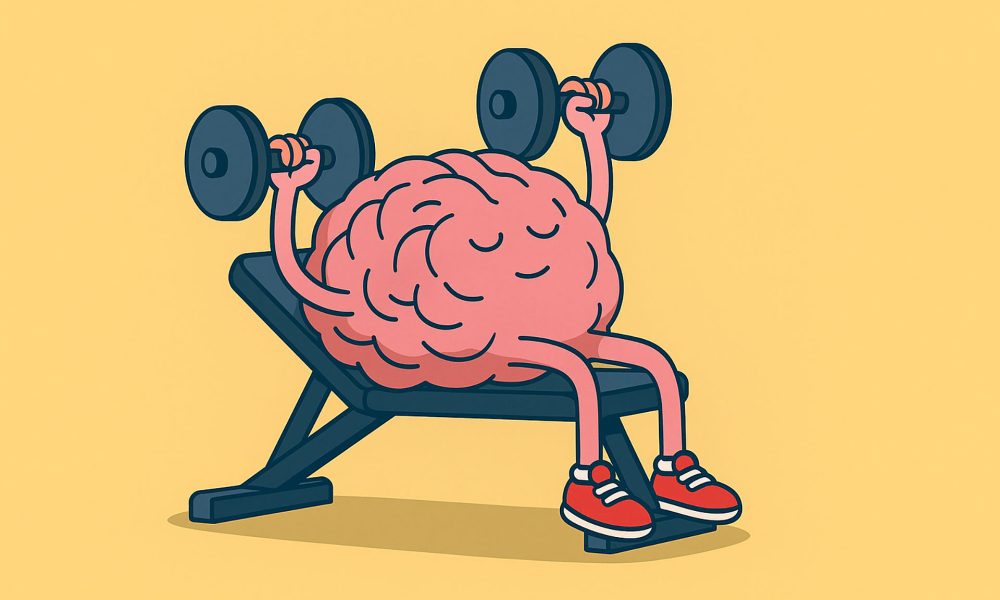Ever feel like your brain’s running on empty? Struggling to stay calm when life gets chaotic? You’re not alone. Just as our bodies need exercise, our minds crave workouts, too. Ready to boost your brainpower, stress less, and find balance? Let’s dive into the life-changing world of mental fitness and meditation.
Table Of Content
What Is Mental Fitness and Why Is It Important?
Mental fitness isn’t just the absence of anxiety or stress—it’s your brain’s strength and flexibility. It’s the secret sauce for managing life’s curveballs and thriving under pressure. It includes emotional resilience, cognitive agility, and a strong mindset.
Think of it as your internal gym—it’s where you build the mental muscles to stay focused, make smart decisions, and maintain healthy relationships. And guess what? It’s just as crucial as physical fitness for overall wellness.
The world’s happiest and most successful people aren’t just free from mental illness—they proactively cultivate their mental fitness, too. Celebrities like Oprah Winfrey and athletes like LeBron James regularly engage in practices that enhance their mental strength and emotional resilience.

Mental Fitness vs. Mental Health: Understanding the Differences
While mental health refers to emotional and psychological well-being, mental fitness is about proactively strengthening your mind. Think of mental health as your baseline and mental fitness as the daily training that elevates your emotional and cognitive skills. Just as physical therapists and personal trainers play different roles in your physical wellness, mental health interventions and mental fitness practices serve distinct purposes.
Mental fitness is about what you can do every day to feel mentally strong—like brushing your teeth but for your brain. For example, you might turn to a therapist when you’re overwhelmed, but turn to meditation to stay focused during a busy week. It’s not either-or—they support each other. Think of mental health as healing and support, and fitness as daily strength-building.
Benefits of Mental Fitness: How It Enhances Your Life
Imagine waking up every day feeling clear-headed, resilient, and ready for whatever comes your way. That’s the promise of strong mental fitness. It doesn’t just help you manage stress—it actively enhances nearly every aspect of your life. Here are just a few ways that boosting your mental fitness and meditation practice can significantly improve your daily experiences:
- Sharper focus and improved memory: Mental workouts sharpen your cognitive abilities and memory.
- Better stress management: With a fit mind, life’s hurdles become more manageable.
- Emotional balance: Greater emotional resilience helps you bounce back from setbacks quicker.
- Improved relationships: Enhanced empathy and emotional intelligence boost connections with others.
Investing in mental fitness and meditation means investing in your overall quality of life—more clarity, less stress, and stronger connections.

How Mental Fitness Supports Daily Productivity
Ever find yourself staring at your screen, struggling to focus, even after your third cup of coffee? That’s where it steps in. When your mind is clear and emotionally balanced, it’s easier to prioritize tasks, make decisions, and actually finish what you start—without feeling drained by noon.
Boosting your mental fitness through habits like meditation and mindfulness helps you stay calm under pressure and get more done with less stress. It’s not about working harder—it’s about thinking sharper, feeling steadier, and making space for what really matters. Even five minutes of mindfulness can shift your day from scattered to steady.
How to Improve Mental Fitness: Effective Strategies and Tips
Great news—you don’t need special equipment or countless hours. Simple changes to your daily habits and activities can dramatically enhance your mental agility and emotional resilience. Here’s how you can kickstart your journey to improved mental fitness:

Top Exercises to Boost Your Mental Fitness
- Mindfulness Meditation: Mindfulness reduces stress and enhances emotional control. Just five minutes a day—sitting quietly, following your breath—can help you reset. [1]
- Physical Activity: Exercise boosts mood-enhancing endorphins and reduces anxiety. Even a brisk walk around the block can clear your head and spark new ideas.[2]
- Continuous Learning: Learning new skills builds cognitive flexibility and resilience. This could be anything from trying out a new recipe to taking an online course—what matters is staying curious.
- Breathwork Techniques: Simple breathing exercises like box breathing can calm your nervous system and bring focus fast. It’s a powerful reset button for your brain in high-stress moments.
- Digital Breaks: Step away from screens for even five minutes to give your brain breathing room. Short tech-free pauses throughout the day can boost clarity and lower mental fatigue.
- Creative Expression: Engaging in creativity—whether it’s doodling, playing music, or writing—stimulates different parts of the brain and helps process emotions. It’s mental movement that feels fun, not forced.

Daily Habits to Cultivate Mental Fitness
- Healthy Sleep Patterns: Aim for 7-9 hours per night to keep your brain sharp and emotions steady. [3]
- Regular Social Interaction: Maintain social connections for improved mental health.
- Journaling Gratitude: Regularly writing down what you’re grateful for boosts positivity and mental resilience.
If you’re short on time, stack your habits into your existing routine. Journal for two minutes right after brushing your teeth. Call a friend during your commute. Or do a quick body scan before you get out of bed. It grows in these everyday moments—no big effort required.
The Role of Mindfulness in Mental Fitness
Mindfulness isn’t just a buzzword—it’s a powerful tool for improving your mental fitness. At its core, mindfulness is about being fully present and engaging with your current experiences without judgment. Regular mindfulness practice can transform your mental landscape by sharpening your focus and soothing your emotional state. Here’s why mindfulness deserves a spot in your daily routine:
- Enhances focus and clarity.
- Significantly reduces stress and anxiety.
- Boosts emotional resilience and mood stability.
Incorporating mindfulness into your routine is like giving your mind a daily spa treatment—refreshing, calming, and revitalizing.
Techniques like meditation, deep breathing, and cognitive reframing help you navigate stress better, keeping anxiety at bay. You don’t need to sit cross-legged for an hour to be mindful. Try noticing the taste of your morning coffee or taking a deep breath before replying to a stressful email. These little shifts bring your attention back to the present—and over time, they make your mind more resilient.

The Science Behind Mental Fitness and Meditation
Meditation is more than just a calming practice; it’s a workout for your brain. Research indicates that regular meditation can lead to structural changes in the brain, enhancing areas responsible for attention, memory, and emotional regulation. For instance, studies have shown that meditation can increase gray matter density in the hippocampus, which is crucial for learning and memory, and decrease the size of the amygdala, which is associated with stress and anxiety responses.
These findings suggest that incorporating meditation into your routine can be a powerful tool for mental fitness and meditation. By strengthening neural pathways and promoting neuroplasticity, meditation helps improve focus, reduce stress, and enhance overall cognitive function. This aligns with the concept of mental fitness, emphasizing proactive strategies to maintain and improve mental well-being.
You should also read “21 day Mental Fitness Challenge with Siddha Meditate“
Assessing Your Mental Fitness Level: Tools and Techniques
Curious to know how mentally fit you currently are? Luckily, measuring your mental fitness is straightforward with accessible tools and simple techniques. Regular assessments can help pinpoint areas for improvement and celebrate your progress. Here are effective ways to gauge your mental fitness:
- Self-assessment Questionnaires: Tools like Psychology Today’s Mental Fitness Quiz and Siddha Meditate’s Mental Fitness Assessment offer insights into your current state.
- Mindfulness Check-ins: Regularly pause and assess your emotional and cognitive states.
Regular check-ins not only track your progress but also reinforce your commitment to maintaining optimal mental fitness.
Ready to embrace a calmer, happier life?

Take your mental fitness journey further with Siddha Meditate. Our guided meditation classes offer personalized support and techniques designed to enhance your emotional resilience, sharpen your cognitive abilities, and help you live a balanced, stress-free life. Sign up for your first meditation class today and transform your mental wellness from restless to resilient!
FAQs about Mental Fitness and Meditation
1. What is mental fitness, and how does it differ from mental health?
Mental fitness refers to the proactive practices that enhance your brain’s strength and flexibility, enabling you to handle stress, stay focused, and maintain emotional balance. While mental health encompasses your overall psychological well-being, It is about building resilience and cognitive agility through daily habits like meditation and mindfulness.
2. How can I improve my mental fitness daily?
Improving mental fitness doesn’t require drastic changes. Simple daily habits like mindfulness meditation, regular physical activity, and continuous learning can significantly boost your cognitive functions. Incorporating these practices into your routine helps in enhancing focus, reducing stress, and promoting emotional resilience.
3. How does meditation contribute to mental fitness?
Regular practice can lead to structural changes in the brain, improving areas responsible for attention, memory, and emotional regulation. By fostering mindfulness, meditation enhances your ability to stay present, manage stress, and build emotional resilience.
4. What are some effective mental fitness exercises?
Effective mental fitness exercises include mindfulness meditation, physical activities like walking or yoga, and engaging in new learning experiences. These practices help in sharpening cognitive abilities, improving memory, and enhancing emotional well-being.
[1] “Meditation: A simple, fast way to reduce stress” Meditation: A simple, fast way to reduce stress
[2] “Benefits of Physical Activity” Benefits of Physical Activity
[3] “How Much Sleep Do You Need?” How Much Sleep Do You Need?







